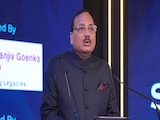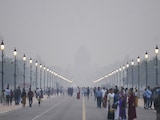File photo of Indian Mujahideen co-founder Yasin Bhatkal.
Mumbai:
Indian Mujahideen co-founder Yasin Bhatkal, who is behind bars in the July 13, 2011 blasts case, had planned to blow up a police van in the crowded Dadar area, but could not do so as it had moved away by the time he reached there, sources in the Maharashtra ATS said today.
"He wanted to kill the policemen in the van," the sources said.
Bhatkal could not find the vehicle on the fateful day after which he planted the fourth explosive in a nearby dustbin, which failed to blow up, they said.
Three powerful blasts had ripped through crowded areas in Mumbai on the evening of July 13, 2011, killing at least 21 people and injuring 141.
The first explosion had rocked Zaveri Bazar, a popular jewellery market, at 6.50 pm. A minute later, another blast shook the busy business area Opera House. The third blast ripped through the crowded Dadar (West) area in Central Mumbai at 7.04 pm.
Interrogation of Bhatkal has revealed that the home-grown terror group had actually planted four explosives at four spots, but the fourth bomb, placed in a dustbin near a crowded flower market at Dadar (East) area, did not go off.
"Bhatkal and wanted accused Tehseen Akhtar Shaikh, who carried two explosives with them, had plans to attach a bomb to a police van usually stationed near the flower market at Dadar (East).
"However, on that particular day, the van was not found by Bhatkal in the area. He was running out of time, because of which he placed the explosive in a dustbin. But the bomb did not explode," said an ATS official after interrogating Yasin and his aide Asadullah Akhtar alias Tabrez.
However, the unexploded bomb was never found, the officer said adding that, "It might have been lifted away along with other waste by the garbage trucks."
On Wednesday, Bhatkal and his aide Akhtar were arrested here by the ATS in the 2011 Mimi terror attack case after being brought to the city from New Delhi. The two were produced before a MCOCA court yesterday, which remanded them to ATS custody till February 18. .
"A few days before the July 13 blasts, four pressure cookers were purchased from two shops here. Each pressure cooker, fixed with a bomb, was placed at the four spots," the ATS sources said.
About 4-5 kg explosive material was procured from Mangalore while the other supporting material such as batteries, digital clock, soldering machine, board circuits and transistors were purchased from shops in Mumbai, which have been identified, they said.
The accused had gone to Mangalore in a private bus from Dadar and returned to Mumbai the next day with the explosives, the officer said, but did not reveal the exact date on which the terror suspects had travelled.
The ATS also claimed that Bhatkal and Tehseen planted bomb on a bus stop at Dadar (West) on July 13.
Wanted accused Waqas Ibrahim Sad, who is a Pakistani, and arrested accused Asadullah Akhtar had planted bombs at Zaveri Bazaar and Opera house.
Before finalising these four spots, Bhatkal along with his associates also did a recce of nearly a dozen of potential targets, including police headquarters in the city.
"Maharashtra ATS and state police headquarters, Mumbai Police headquarters, Colaba market, Dadar TT (East), Mumbadevi temple, Gol Deval Temple, Andheri's McDonalds and its surroundings and Juhu beach, were also recced, apart from the four sites, which were targeted on the July 13," the officer said.
Bhatkal and his team had visited all these sites at least thrice since February 2011 and later zeroed in on the four sites that witnessed blasts.
According to the ATS, Bhatkal, Waqas, Asadullah Akhtar had since February 2011 rented a third floor flat in Byculla's Habib building where they allegedly assembled explosives.
After the blasts, the trio went back to the rented house while Tehseen had gone to "somewhere else", the officer said.
Waqas also underwent treatment for malaria, earlier suspected to be dengue, at the government-run J J Hospital here prior to the blasts, he said.
"He wanted to kill the policemen in the van," the sources said.
Bhatkal could not find the vehicle on the fateful day after which he planted the fourth explosive in a nearby dustbin, which failed to blow up, they said.
Three powerful blasts had ripped through crowded areas in Mumbai on the evening of July 13, 2011, killing at least 21 people and injuring 141.
The first explosion had rocked Zaveri Bazar, a popular jewellery market, at 6.50 pm. A minute later, another blast shook the busy business area Opera House. The third blast ripped through the crowded Dadar (West) area in Central Mumbai at 7.04 pm.
Interrogation of Bhatkal has revealed that the home-grown terror group had actually planted four explosives at four spots, but the fourth bomb, placed in a dustbin near a crowded flower market at Dadar (East) area, did not go off.
"Bhatkal and wanted accused Tehseen Akhtar Shaikh, who carried two explosives with them, had plans to attach a bomb to a police van usually stationed near the flower market at Dadar (East).
"However, on that particular day, the van was not found by Bhatkal in the area. He was running out of time, because of which he placed the explosive in a dustbin. But the bomb did not explode," said an ATS official after interrogating Yasin and his aide Asadullah Akhtar alias Tabrez.
However, the unexploded bomb was never found, the officer said adding that, "It might have been lifted away along with other waste by the garbage trucks."
On Wednesday, Bhatkal and his aide Akhtar were arrested here by the ATS in the 2011 Mimi terror attack case after being brought to the city from New Delhi. The two were produced before a MCOCA court yesterday, which remanded them to ATS custody till February 18. .
"A few days before the July 13 blasts, four pressure cookers were purchased from two shops here. Each pressure cooker, fixed with a bomb, was placed at the four spots," the ATS sources said.
About 4-5 kg explosive material was procured from Mangalore while the other supporting material such as batteries, digital clock, soldering machine, board circuits and transistors were purchased from shops in Mumbai, which have been identified, they said.
The accused had gone to Mangalore in a private bus from Dadar and returned to Mumbai the next day with the explosives, the officer said, but did not reveal the exact date on which the terror suspects had travelled.
The ATS also claimed that Bhatkal and Tehseen planted bomb on a bus stop at Dadar (West) on July 13.
Wanted accused Waqas Ibrahim Sad, who is a Pakistani, and arrested accused Asadullah Akhtar had planted bombs at Zaveri Bazaar and Opera house.
Before finalising these four spots, Bhatkal along with his associates also did a recce of nearly a dozen of potential targets, including police headquarters in the city.
"Maharashtra ATS and state police headquarters, Mumbai Police headquarters, Colaba market, Dadar TT (East), Mumbadevi temple, Gol Deval Temple, Andheri's McDonalds and its surroundings and Juhu beach, were also recced, apart from the four sites, which were targeted on the July 13," the officer said.
Bhatkal and his team had visited all these sites at least thrice since February 2011 and later zeroed in on the four sites that witnessed blasts.
According to the ATS, Bhatkal, Waqas, Asadullah Akhtar had since February 2011 rented a third floor flat in Byculla's Habib building where they allegedly assembled explosives.
After the blasts, the trio went back to the rented house while Tehseen had gone to "somewhere else", the officer said.
Waqas also underwent treatment for malaria, earlier suspected to be dengue, at the government-run J J Hospital here prior to the blasts, he said.















